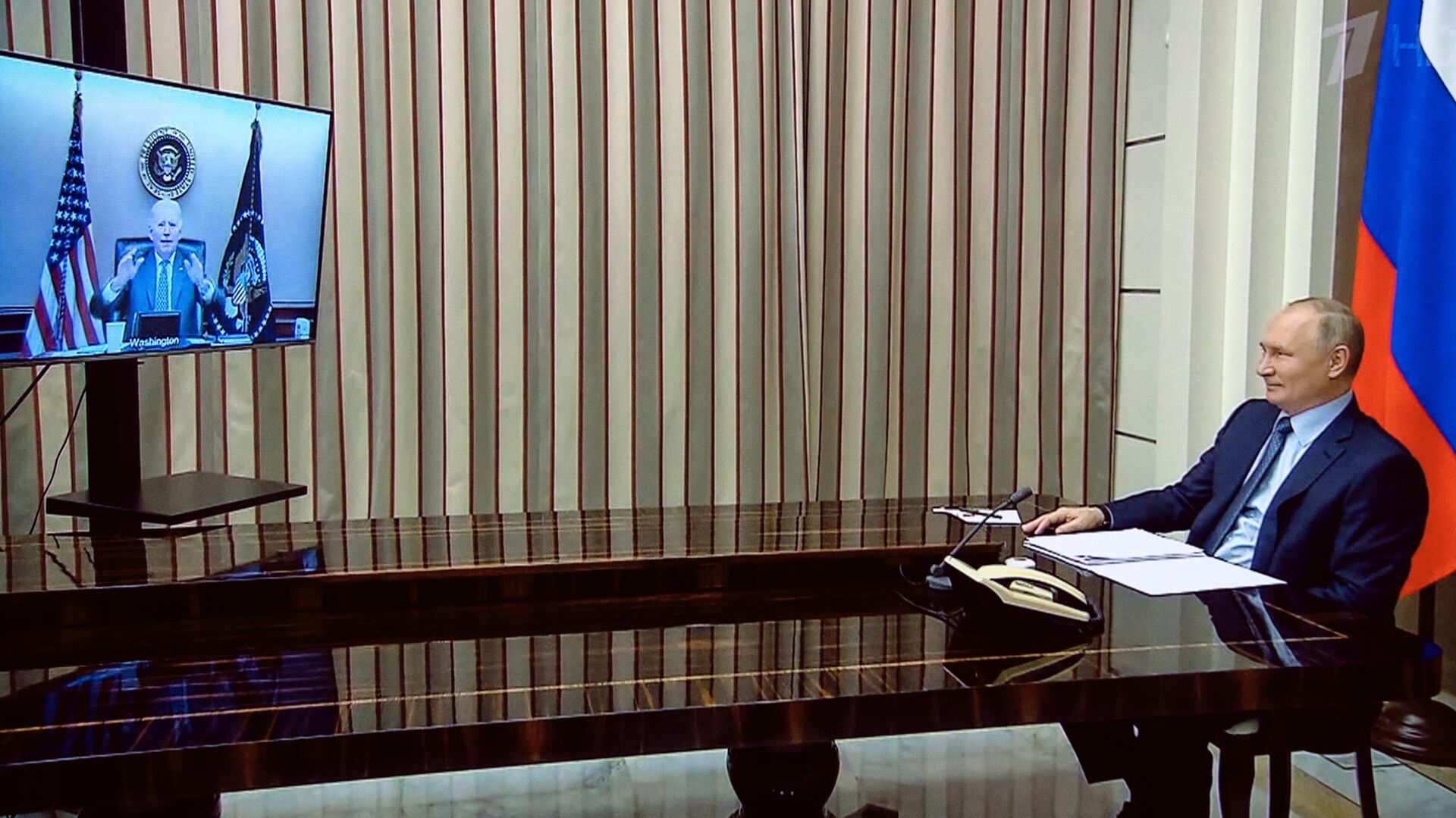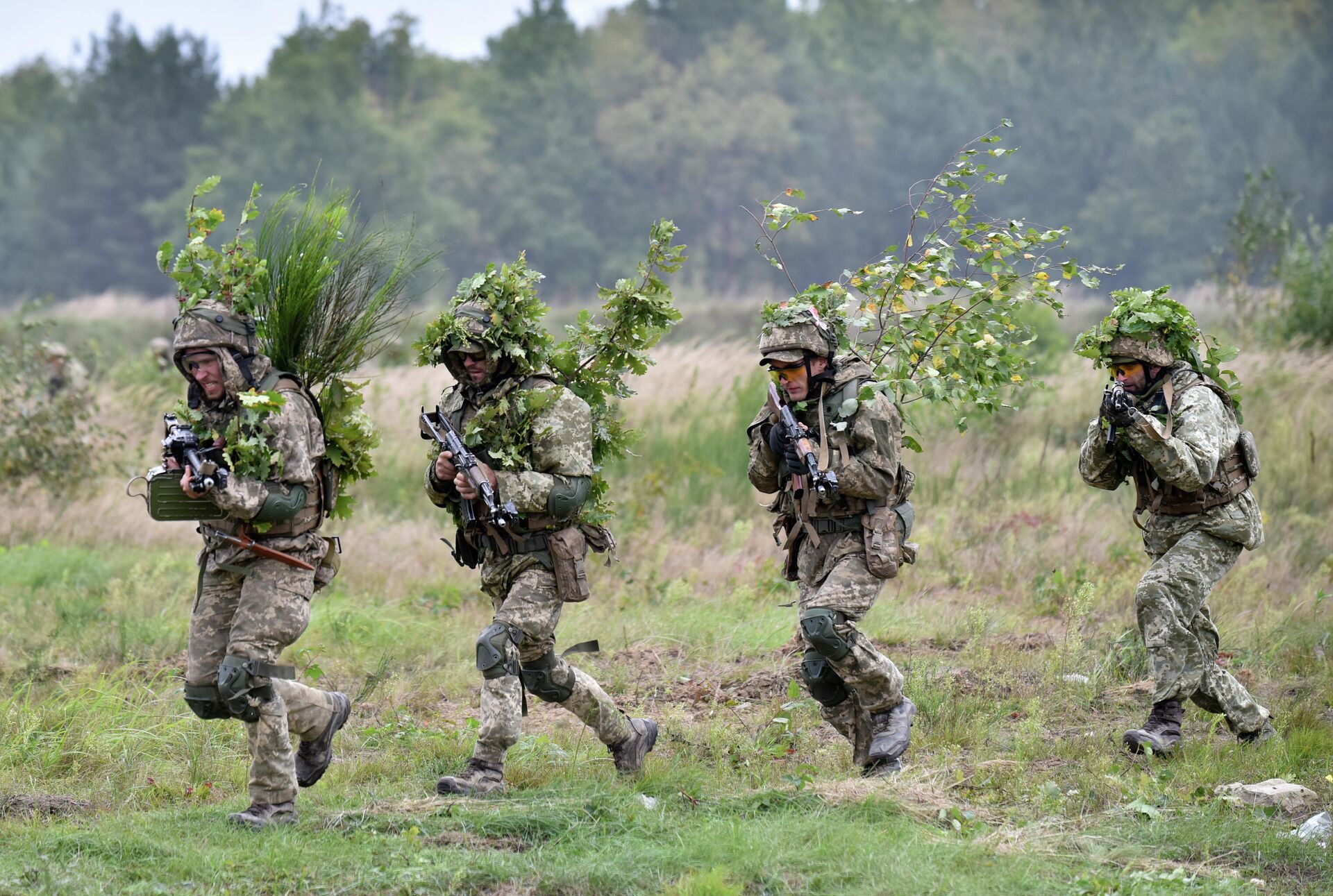https://sputnikglobe.com/20211207/biden-warns-putin-of-economic-sanctions-and-other-measures-in-event-of-ukraine-military-escalation-1091329502.html
Biden Warns Putin of Economic Sanctions and Other Measures in Event of Ukraine Military Escalation
Biden Warns Putin of Economic Sanctions and Other Measures in Event of Ukraine Military Escalation
Sputnik International
Joe Biden has warned Vladimir Putin of sanctions
2021-12-07T18:18+0000
2021-12-07T18:18+0000
2022-08-06T13:27+0000
joe biden
russia
vladimir putin
us
https://cdn1.img.sputnikglobe.com/img/07e5/0c/07/1091330113_0:66:3410:1984_1920x0_80_0_0_f674c51dc8566b3a6c4d8983a3100ebd.jpg
The Tuesday call between Biden and Putin lasted two hours and one minute and covered a range of topics, but focused primarily on Russian troops deployed near the country's western borders, which Western media is widely reporting as a sign of an imminent invasion of Ukraine."President Biden voiced the deep concerns of the United States and our European Allies about Russia’s escalation of forces surrounding Ukraine and made clear that the US and our Allies would respond with strong economic and other measures in the event of military escalation," a readout of the call released by the White House said.The White House also noted Biden and Putin discussed several issues on which the US and Russia could work together, including the dialogue on Strategic Stability, combating ransomware, and relations with Iran.Biden's threat of economic retribution comes after reports that US sanctions could include a ban on buying Russian sovereign debt on the secondary market, sanctions on the Nord Stream 2 pipeline from Russia to Germany that's almost finished being built, and even excluding Russia from the SWIFT money transfer system based in Brussels, Belgium.Kremlin StatementIn its own statement following the phone call, the Kremlin said that the meeting was "frank and businesslike" and had focused on implementation of the results of the two leaders' in-person summit in Geneva, Switzerland, in June.He said that Russia is seriously interested in obtaining reliable guarantees that NATO would not expand any further eastward, as the Brussels-based alliance had promised after the fall of socialism in Eastern Europe and the Warsaw Pact alliance that had bound them together.The Russian president accused NATO of making dangerous attempts to take control of Ukraine and was building up its infrastructure near Russia's borders. He told Biden it was wrong to put all the responsibility on Russia's shoulders for current tensions between the two nations. He also denounced Kiev's destructive attitude toward a peace settlement in eastern Ukraine.Perennial CrisisSimilar threats followed Russian military drills held in the region in April, which were also claimed to be the prelude to an invasion of Ukraine by Kiev and the Western press. However, the contrivance helped build Kiev's case for being allowed to join the NATO alliance, which Brussels said would be fast-tracked.Citing anonymous intelligence sources, Western media have built a story in recent weeks that some 175,000 Russian troops have massed near the Ukrainian border and are preparing for an invasion of the country as soon as January. The Kremlin has denied that an invasion is being prepared and called the reports a "fake news campaign." Similar claims have been made about the Russian-speaking Donbass region in eastern Ukraine, which has fought a seven-year-long war with Kiev to defend its autonomy. Kiev and NATO have claimed the self-proclaimed Donetsk People's Republic and Lugansk People's Republic in the Donbas are Russian proxies. Moscow has denied any involvement in the Ukrainian conflict and has long supported the Minsk Protocol for peace in Ukraine alongside France, Germany, and the Organization for Security and Co-operation in Europe (OSCE).Since reports of Russian troops in southern Russia began last month, Ukraine has moved roughly half of its forces into the Donbas conflict zone.Reactions to Meeting"We support President Biden's call on the Russian leader to return to diplomatic instruments and ensure de-escalation in our region. We will continue to coordinate with the American side to achieve concrete results in the interests of Ukraine," Podolyak said.Sullivan added that Biden had debriefed the leaders of several NATO nations immediately after his call with Putin, and would speak with Zelenskyy on Thursday.
Sputnik International
feedback@sputniknews.com
+74956456601
MIA „Rossiya Segodnya“
2021
News
en_EN
Sputnik International
feedback@sputniknews.com
+74956456601
MIA „Rossiya Segodnya“
Sputnik International
feedback@sputniknews.com
+74956456601
MIA „Rossiya Segodnya“
anti-russia sanctions, putin-biden call, ukraine crisis
anti-russia sanctions, putin-biden call, ukraine crisis
Biden Warns Putin of Economic Sanctions and Other Measures in Event of Ukraine Military Escalation
18:18 GMT 07.12.2021 (Updated: 13:27 GMT 06.08.2022) During a phone conversation with Russian President Vladimir Putin on Tuesday, US President Joe Biden said Washington supports Ukraine's territorial integrity and called for de-escalation.
The
Tuesday call between Biden and Putin lasted two hours and one minute and covered a range of topics, but focused primarily on Russian troops deployed near the country's western borders, which
Western media is
widely reporting as a sign of an imminent invasion of Ukraine.
"President Biden voiced the deep concerns of the United States and our European Allies about Russia’s escalation of forces surrounding Ukraine and made clear that the US and our Allies would respond with strong economic and other measures in the event of military escalation," a readout of the call released by the White House said.
"President Biden reiterated his support for Ukraine’s sovereignty and territorial integrity and called for de-escalation and a return to diplomacy. The two presidents tasked their teams to follow up, and the US will do so in close coordination with allies and partners," the statement added.
The White House also noted Biden and Putin discussed several issues on which the US and Russia could work together, including the dialogue on Strategic Stability, combating ransomware, and relations with Iran.
Biden's threat of economic retribution comes after reports that US sanctions could
include a ban on buying Russian sovereign debt on the secondary market, sanctions on the
Nord Stream 2 pipeline from Russia to Germany that's almost finished being built, and even
excluding Russia from the SWIFT money transfer system based in Brussels, Belgium.
Separately on Tuesday, the US House of Representatives' rules committee released a
compromise text for the 2022 Pentagon budget, which notably did not include sanctions on Nord Stream 2. However, a congressional aide told Reuters they have an understanding with Berlin to shut the underwater gas pipeline if Russia invades Ukraine.
In its own statement following the phone call, the Kremlin said that the meeting was "frank and businesslike" and had focused on implementation of the results of the two leaders' in-person
summit in Geneva, Switzerland, in June.
Putin and Biden recalled their two nations' alliance against fascism during World War II and emphasized that it should serve as an example for building contacts. Putin also offered to cancel accumulated restrictions on diplomatic missions and to normalize other aspects of their relations.
He said that Russia is seriously interested in obtaining reliable guarantees that NATO would not expand any further eastward, as the Brussels-based alliance had promised after the fall of socialism in Eastern Europe and the Warsaw Pact alliance that had bound them together.
The Russian president accused NATO of making dangerous attempts to take control of Ukraine and was building up its infrastructure near Russia's borders. He told Biden it was wrong to put all the responsibility on Russia's shoulders for current tensions between the two nations. He also denounced Kiev's destructive attitude toward a peace settlement in eastern Ukraine.
Similar threats followed
Russian military drills held in the region in April, which were
also claimed to be the prelude to an invasion of Ukraine by Kiev and the Western press. However, the contrivance helped build Kiev's case for being allowed to
join the NATO alliance, which Brussels said would be fast-tracked.
Citing anonymous intelligence sources, Western media have built a story in recent weeks that some 175,000 Russian troops have massed near the Ukrainian border and are preparing for an invasion of the country as soon as January. The Kremlin has denied that an invasion is being prepared and called the reports a "fake news campaign."
The US has dramatically increased military deployments by its troops and NATO forces to Eastern Europe in recent years. NATO has postured as confronting "Russian aggression" in Europe since the events of 2014, when a US-backed coup in Kiev brought nationalists to power with a political program for persecuting non-Ukrainian citizens of the country, including the 29.6% of the population for whom Russian is the primary language. After predominantly Russian-speaking Crimea declared independence in March 2014 and then voted in a referendum to rejoin the Russian Federation, Kiev denounced it as an illegal annexation and the West followed suit.
Similar claims have been made about the Russian-speaking Donbass region in eastern Ukraine, which has fought a seven-year-long war with Kiev to defend its autonomy. Kiev and NATO have claimed the self-proclaimed Donetsk People's Republic and Lugansk People's Republic in the Donbas are Russian proxies. Moscow has
denied any involvement in the Ukrainian conflict and has long supported the
Minsk Protocol for peace in Ukraine alongside France, Germany, and the Organization for Security and Co-operation in Europe (OSCE).
Since reports of Russian troops in southern Russia began last month, Ukraine has moved roughly
half of its forces into the Donbas conflict zone.
After Biden's phone call on Tuesday, Mykhailo Podolyak, an adviser to Ukrainian President Volodymyr Zelenskyy, said Kiev was "grateful to President Biden for his unwavering support for Ukraine's sovereignty and territorial integrity."
"We support President Biden's call on the Russian leader to return to diplomatic instruments and ensure de-escalation in our region. We will continue to coordinate with the American side to achieve concrete results in the interests of Ukraine," Podolyak said.
US national security adviser Jake Sullivan said in a Tuesday press conference that the US would provide additional war materiel to Ukraine in case of a Russian invasion, adding that the US was prepared to do "things we didn't do" in 2014 to deter Russia.
Sullivan added that Biden had debriefed the leaders of several NATO nations immediately after his call with Putin, and would speak with Zelenskyy on Thursday.



